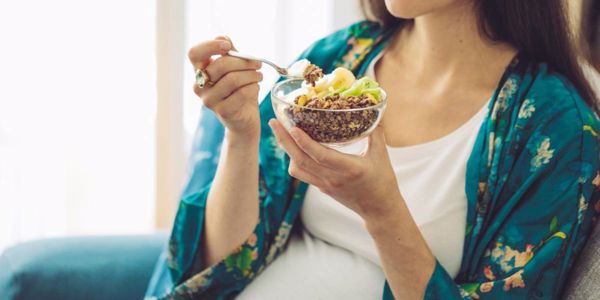People are often embarrassed to talk about toilet habits, even though it is part of our everyday life. As dietitians we are always asking people about their poo - remember what goes into your body will affect what comes out of your body.
What is constipation?
Well it can mean different things to different people. Some will find they are straining when going to the toilet or not emptying their bowels completely, whereas for others it is about the frequency and type of their poop.
Why is constipation more common in pregnancy?
During pregnancy, there is an increase in the hormone progesterone and this can cause your digestive tract to slow down. This means that the food we eat has a maximum time to be absorbed by our bodies which is pretty smart, right? This means that even when you aren’t managing as much food (such as with morning sickness), the baby gets priority with nutrition. There is often a decrease in physical activity and dietary changes which can make it more likely too.
Did you know – that your gut contains 9m of folded intestines! There are clever muscles all the way along which allow for your gut to have motility and push food through your body.
What can you do?
- Aim to drink more fluid, aiming for 2L a day. If you are struggling to keep track of your fluid intake, consider filling a water bottle at the start of the day to help you count how much you drink.
- Try to be more active with some gentle exercise. Aim to move every day, whether that is a walk, exercise class or yoga as movement will help to activate and increase your bowel muscles.
- Check in with your toileting habits. Don’t ignore the urge to go to the toilet. Try to rest your feet on a low stool while going to the toilet so that your knees are raised above your hips.
- Check in with your stress levels. Meditation and mindfulness can help your bowel functions through the gut-brain axis!
Increase your fibre intake:
- Sprinkle some seeds and nuts onto your breakfast, yoghurts, salads or soup. Linseeds/flaxseeds work a treat - try ½ tbsp /day and gradually increase to 2tbsp /day.
- Try to replace some meat with beans, lentils and pulses.
- Remember frozen fruit and vegetables are just as nutritious – having some ready chopped frozen F&V on hand can be an easy way to boost your fibre intake.
- Switch from white to wholegrain or seeded bread, pasta, wraps and rice.
- Eating 100g of prunes or 2 kiwi fruits per day have been shown to increase bowel movements, trial for a few weeks and monitor your bowels!
Always increase intake of fibre SLOWLY and monitor your tolerance. If you are really struggling and haven’t noticed any improvements despite dietary and lifestyle changes, you could try a laxative or stool softener. Speak with your GP if you have any concerns.






